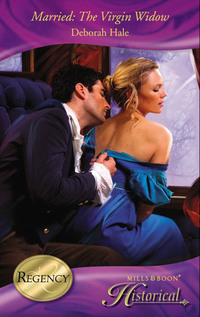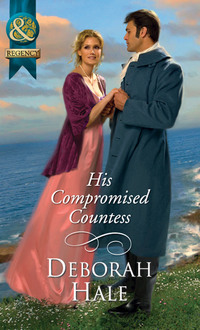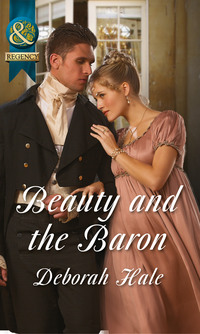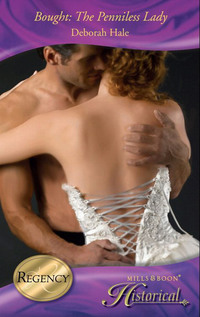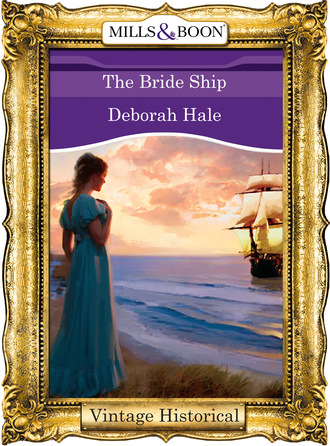
Полная версия
The Bride Ship
Few things put Robert Kerr out of temper worse than a suggestion he had done less than his duty.
Trudging back to where she stood, he muttered, “This is not a social call! Besides, I did not suppose you would accept if I had offered.”
He thrust out his arm at a stiff, awkward angle to demonstrate he took no pleasure in the civility she had demanded from him. And perhaps to convince himself, as well.
“Your Excellency?” Duckworth scurried along beside them. “Shall I inform the kitchen staff you will have a guest for tea?”
Over Mrs. Finch’s head, the governor fixed his aide with a severe look. He preferred to take a modest tray in his study, continuing to read reports and sign papers between sips of tea and bites of biscuit. Now he would be obliged to offer the vexing woman his hospitality.
“Madam, would you care to discuss your situation over tea?” He tried to ignore the warm pressure of her hand on his arm.
For a moment, her frosty manner thawed. “Proper food? Oh, I should be most grateful! When our ship was blown off course by the storm, some of our supplies were lost. We have been on very tight rations the past fortnight.”
Before the governor could think what to reply, his aide piped up, “I’ll go on ahead then, sir, and alert Miz Ada.”
Off Duckworth dashed, leaving Sir Robert all on his own to deal with a devilishly awkward situation. He was not much accustomed to conversing with women and went out of his way to avoid it whenever possible. Now he had little choice.
Before he could marshal some manner of civil remark, Mrs. Finch spoke—or rather gasped. “I beg…your pardon, sir. But would you…kindly…slow down!”
A swift sidelong glance confirmed the lady was hard-pressed to match his brisk parade-ground march up the hill. Her face had flushed to a high color. And her bosom, of which he had a far clearer view than he would have liked, heaved in a most unsettling manner. What if the creature swooned into his arms or some such nonsense?
To his horror, the governor’s body roused at the prospect of another man’s wife in his arms. That was enough to curb his stride. Where was Mr. Finch, anyway?
“Your husband?” he asked. “Is he back on the ship? I have no objection to him accompanying us.” Perhaps, between them, he and Finch could settle all this, man to man.
Trust him to choose the worst possible thing to say, then blurt it out in the most bald, offensive manner possible. Judging by the look that came over Mrs. Finch’s face, Sir Robert had no doubt that was exactly what he’d done.
By now, Jocelyn had been a widow longer than she’d been a wife. Time and necessity had taught her to speak of her late husband without excessive distress. Why should the governor’s abrupt remark make her eyes sting and her lip quiver?
Perhaps it was his offhand presumption that Ned must be alive. Or perhaps it was the foolish rush of attraction she’d experienced upon first meeting Sir Robert Kerr that had made her feel disloyal to her late husband’s memory. Though she doubted he meant to distress her, Jocelyn refused to give him the satisfaction of knowing he had.
“My husband has been dead nearly three years, sir.” She congratulated herself on getting the words out without her voice breaking.
The muscles of his arm tensed in response to her words and he checked his rapid pace further still as they turned onto a wide avenue that ran parallel to the harbor. “Waterloo? We lost too many good men that day.”
Jocelyn sensed he was speaking from intimate knowledge rather than in general terms. “Ned was killed on the previous day at…”
“The crossroads.” Sir Robert heaved a sigh that betrayed grief with an edge of bitterness. “You have my most sincere condolences, Mrs. Finch.”
So her husband’s commanding officer had written when informing her of Ned’s death. That and her widow’s pittance might buy her a cup of chocolate.
The governor meant well, Jocelyn told herself. She should try to cultivate his sympathy by every possible means. But she could not subdue the hostility he had roused with his offensive assumptions about her mission to the colony.
“This way.” He led her off the street onto a broad driveway that sloped gently up toward a large, elegant stone mansion.
In Jocelyn’s opinion, the pair of wooden sentry boxes on either side of the fine double staircase rather spoiled the classic lines of the house. Still, it looked like the sort of place where one could expect to be served a bountiful and toothsome tea.
The courteous young man from the wharf threw open the front door as the governor ushered Jocelyn up the stairs. “It has all been arranged, Sir Robert. Tea will be served in the drawing room, shortly.”
The poor fellow still sounded winded from his run, though Jocelyn had to admit the distance from here to the wharf would not have merited the fuss and delay of summoning a carriage.
“Thank you, Duckworth.” The governor handed his hat to the young man. “Your assistance this afternoon has been invaluable, as ever.”
He gestured toward a doorway on the left-hand side of hall. “Through here, if you please, madam. You will find the drawing room just beyond the receiving room.”
Jocelyn glanced around as she walked through a light, handsomely proportioned room that housed a pair of blue satin sofas, several small mahogany tables and over two dozen chairs without looking in the least crowded. Did His Excellency expect her to be overwhelmed by such grand surroundings.
If only he knew! Compared to some of the great houses in which she’d lived or visited, Government House was quite modest and restrained. The drawing room proved even more stately, with its fine Brussels carpet, elegant hanging luster and rich claret-colored draperies. Still it was nothing to awe the daughter of a marquess.
Jocelyn sank down gratefully onto one of several brocade-upholstered armchairs clustered around a tea table. Reminding herself of all she had at stake, she summoned every ounce of charm she could muster to assail Governor Kerr.
“What an elegant residence you have here, sir! It looks very modern. Were you responsible for having it built?”
“Me?” The governor clearly considered her question ridiculous if not downright offensive. “No. For that you must thank Sir John Wentworth and his wife. I should have been content with more modest lodgings. Indeed, I would have preferred them. This is a residence for the type of governor who would rather entertain than work.”
What an impossibly dour fellow! He had not taken a seat, but stood before one of the tall windows that flanked the white marble hearth, his hands behind his back. Jocelyn could scarcely resist the temptation to tease him out of his severity.
“Surely entertaining is part of the work of a governor.” She forced herself to smile, determined to be agreeable in spite of him. “Official receptions, levees, that sort of thing.”
He made no reply, but she thought her words sent a shudder through him.
A young footman entered, just then, bearing a well-laden tray, which he set down upon the tea table. The governor thanked him but made no move to take a seat. Even after the footman had departed, Sir Robert continued to stand beside the hearth, looking tense and ill at ease. Jocelyn considered inviting him to sit down, but it was hardly her place.
“Shall I pour?” she offered at last, desperate to commence their discussion. The sooner she cleared up this dreadful misunderstanding the sooner she could fetch the poor girls off that wretched ship.
“If you would be so kind.” Sir Robert gave a curt nod but still made no move to sit.
Jocelyn perched one delicate cup upon its saucer and poured a generous measure of steaming amber tea into it. How pleasant it felt to handle fine china and silver again.
She lifted the sugar tongs. “How many lumps, sir?”
It took some effort to keep from grinning. If she’d had a cudgel in hand back at the wharf, she might have given him a lump or two—though not the sweet kind!
“No, thank you,” said Sir Robert, but he edged closer to the tea table.
“Cream?” Jocelyn lifted the little pitcher. What a luxury it would be to taste cream in her tea again!
With a decisive shake of his head, the governor perched on the farthest chair away from her and reached for his cup. “I prefer my tea plain.”
“Indeed?” Jocelyn poured a cup for herself, then added three good-sized lumps of sugar, followed by a generous dollop of smooth, thick cream. “I like mine as sweet and rich as I can get it, especially after the recent deprivations of our voyage.”
The governor made some vaguely disapproving noise, deep in his throat…or perhaps he only meant to clear it.
He reached toward the tray and lifted the silver cover off a dish. Jocelyn’s mouth watered in anticipation.
“Bread and butter, Mrs. Finch?”
Bread and butter? Was this the best hospitality Nova Scotia could provide? It took every scrap of restraint Jocelyn could summon to keep from dumping the contents of the dish over her host’s head.
Perhaps he sensed her disappointment. “I seldom have guests to tea, especially on such short notice. This frugal fare suits me well enough.”
What he said was true, Jocelyn acknowledged with a pang of shame for her ingratitude. All the same, she would so love to have been offered her favorite walnut tea cake or the red-currant tart for which the kitchens of Breckland Manor were noted.
Sir Robert uncovered the other dish. “Perhaps you would prefer a muffin, instead?”
He pointed to a pair of small china crocks nestled in one corner of the tea tray. “They’re very good spread with apple butter or blueberry jam.”
“Blueberries?”
The governor nodded. “They grow in some profusion hereabouts on low bushes. They’re more purple than blue, as a matter of fact, especially after they’ve been cooked.”
He passed her a napkin. “The things stain like the very devil, but they have a most agreeable flavor.”
There was something rather touching about the governor’s clumsy, earnest attempts at hospitality. Jocelyn’s antagonism began to soften. After the weevily biscuits and thin, rancid stew she’d been forced to eat for the past two weeks, fresh-baked bread with newly churned butter should taste very good indeed.
Taking a thick slice from the plate, she closed her eyes, the better to savor it. Oh, the crisp crust! Mmm, the sweet, wholesome flavor of the butter, so generously spread! Ah, the soft texture of the bread itself!
Suddenly aware of a strained silence, she opened her eyes to find the governor staring at her with a look of mild horror. Oh dear, had she been making all those sounds of enjoyment—the kind she’d sometimes made in bed with her husband?
A fiery blush prickled up her neck to blaze in her cheeks. At the same time, she battled an urge to laugh.
“Please excuse my manners, sir.” Despite her most strenuous efforts to contain it, a chuckle burst out of her. “The bread is very good.”
To stifle any further unseemly levity, Jocelyn took a large bite of muffin. Too large, she realized as her cheeks bulged.
Of course, the governor would choose that moment, when her mouth was so full she could scarcely chew, let alone speak, to say, “Then let us turn to the matter at hand, shall we?”
Jocelyn could only nod and pray she would not choke.
The governor fortified himself with a sip of tea. “Our conversation on the wharf left me rather…confused. You mentioned a letter that was meant to precede you. I received no such message. Perhaps you would be so good as to explain your purpose in coming to Halifax and who sent you?”
Jocelyn worried down her mouthful of muffin and seized upon his last question to answer first. “I have been sent by Mrs. Dorothea Beamish. Perhaps you have heard of her?”
Recognition flickered in the governor’s cool, blue eyes. Her vast wealth and forceful personality had made Mrs. Beamish widely known.
“I have a second letter of introduction from her,” Jocelyn hastened to add. “Alas, in all the confusion, I left it behind on the ship. I would be happy to retrieve it and present it to you at your earliest convenience.”
Despite the mention of her sponsor, Sir Robert did not look anxious for a second interview. “And what business has Mrs. Beamish in sending a boatload of young women to my colony?”
Had he not heard a word she’d said down on the wharf? Or had he been too busy jumping to his own offensive conclusions to listen?
The words of her former governess ran through Jocelyn’s head. “Remember, my dear, you’ll catch more flies with sugar than with vinegar.” That was all very well, but Sir Robert Kerr did not appear partial to sweets!
“You may have heard of the projects Mrs. Beamish has undertaken to prevent young women who find themselves without friends or resources from sinking into lives of vice?”
The governor nodded. “Commendable work.” More to himself than to Jocelyn, he muttered, “I could use someone like her in this blighted town.”
At last, a scrap of encouragement! Jocelyn seized upon it as eagerly as she had consumed the food. “I am heartened to hear you are in sympathy with our aims, Your Excellency! Mrs. Beamish has established a number of useful institutions for such unfortunate young women back in England. Alas, the need is beginning to outstrip even her resources.”
Jocelyn warmed to a subject dear to her heart. “You may not realize, sir, that the late war robbed many of our country’s young women of the men who would have wed and provided for them.”
The governor’s brow furrowed as he sipped his tea. Clearly he had not given any thought to the plight of his country’s women, and the price they continued to pay for Napoleon’s defeat.
“It occurred to Mrs. Beamish that while there is a shortage of eligible men in Britain, there is an equal shortage of eligible women in the colonies. To that end, she has sponsored a bride ship to Nova Scotia. It is my responsibility to chaperone these young women and find suitable husbands for them before I return to London in the fall. If the project is successful, I may bring more brides to the colony next spring, and the scheme might be expanded to other British territories abroad.”
She stopped to catch her breath, and to encourage some response from the governor, who had been listening to her with grave, silent concentration.
He did not speak right away when she gave him the opportunity. Instead, he drained the last of his tea, then set the empty cup back upon the tray, his features creased in a thoughtful frown. His hesitation troubled Jocelyn. Surely, despite the inauspicious start to their acquaintance, he must see the mutual benefits of this venture?
At last the governor broke his silence. “So it is your intention to spend the summer wedding these young women off to the men of my colony?”
“Indeed it is, sir. To provide the bachelors of Nova Scotia with companions and helpmates, while offering my charges an opportunity to make good and useful lives for themselves.” What fool could fail to endorse such a worthwhile enterprise?
The governor mulled her words for a few moments longer, then rose abruptly and strode back toward the marble mantelpiece.
He was rather like that fine hearth, Jocelyn decided. Handsome in appearance, but hard and cold to the touch. While a cheerful blaze might be kindled within it, she doubted any such fire ever had, or would, warm the empty depths of his heart.
For that reason, it came as a distressing disappointment but no great surprise when he announced, “Your idea sounds all very well, madam. In practice, I fear it would prove otherwise. This colony is not some frivolous marriage market. The men here have important work to do that requires their full concentration. You saw the idle mob that gathered at Power’s Wharf this afternoon. Halifax has no need of such distracting spectacles.”
“That was not our fault!” Jocelyn surged to her feet and threw her napkin down on the tea tray. “Perhaps if more men in your colony had wives and families to occupy their interest, they would not need to seek diversion gawking at incoming ships.”
The governor’s stance grew even more rigid and his frown deepened. “You do not know these people, madam. You do not know this colony. Nor are its peace and welfare your responsibility. They are mine.”
“How can loving wives possibly be a threat to the peace and welfare of your settlers, sir?” Jocelyn longed to seize the breast of his coat and shake some sense into the man. “Have you a wife?”
The instant the words left her mouth, she wished she could recall them. What if, like her, Sir Robert had been brutally bereaved—his heart chilled and hardened by grief?
Her swift impulse of sympathy had no chance to take root.
“Never,” declared the governor. “I have never desired such a distraction from my duties, nor the weight of additional responsibility that a family entails. The bachelors of Nova Scotia would do well to follow my example. I will see to it that your ship is reprovisioned so you may return to England or sail on to another colony where you might be more welcome.”
Jocelyn could scarcely abide the prospect of another hour confined aboard ship, let alone days or weeks. She could not return to England and face Mrs. Beamish with her mission unfulfilled. And what manner of welcome were they likely to receive in another colony, having been turned away from the shores of Nova Scotia?
“You cannot do this to me!” she cried. No man since her father had provoked her to such a rage.
“Not only can I, madam. For the good of this colony, I must.” He headed out of the room, calling for his aide.
Jocelyn nearly overturned the tea table in her haste to catch him.
“Have you forgotten?” She clutched the sleeve of his coat. “I challenged you to a duel. Are you such a coward that you would bundle me out of town before I can defend my honor?”
He stared down at her with undisguised aversion. “Madam, I have no intention of fighting a duel with anyone, least of all a woman. I made a mistake—a perfectly natural one under the circumstances, I believe. But I am willing to apologize for it in public. I will put a notice to that effect in the Halifax Gazette if you wish.”
He turned to his aide, who had just arrived. “Remind me of that, will you, Duckworth? But, first, I would like you to escort Mrs. Finch back to her ship.”
The governor detached her hand from his sleeve, then executed a curt bow. “I wish you a safe journey, madam.”
Before Jocelyn could protest further, he strode from the drawing room.
With a strangled shriek, she lunged for the tea tray and scooped up the blueberry jam pot, determined to hurl it at the governor’s pristine marble hearth…for lack of a more deserving target.
Mr. Duckworth stepped in front of her. “Please don’t, ma’am. It’ll make the most frightful mess.”
That was what she wanted. To leave His Excellency with a vivid purple stain to remember her by!
His aide’s plea stayed her hand. After all, the governor himself would not be obliged to clean up the mess.
She held the jam pot out to Mr. Duckworth. “I pity you with all my heart, sir, having to work for such a tyrant.”
The young man relieved her of the crock before he replied, “There is no man in the colony I’d rather serve, ma’am.”
Poor young fool, Jocelyn thought as she permitted him to escort her out of Government House and down toward the wharf. Every step of the way, she struggled to invent an excuse that would prevent her from getting back on that ship. Once aboard, she was certain Governor Kerr would never permit her to set foot off it again. How could she hope to plead her case if she could not communicate with anyone in town?
As they caught sight of the wharf, Mr. Duckworth sighed. “Not another crowd gathered? I hope we shan’t need to call out the militia to disperse these people.”
The nearer they drew, the more evident it became that these curious onlookers were different from the first group. For they were mostly women.
A number stood around the wharf in small clusters, talking together and pointing toward the ship. A few appeared to be chatting with the young soldier Governor Kerr had left on guard. From their garish dress and forward manner, Jocelyn took them to be the kind of women Sir Robert had accused her of bringing to his colony. Perhaps they had got word of the governor’s slander and hoped to catch a glimpse their rivals.
Jocelyn could not recall seeing so many women of ill repute together at one time in London…at least not the parts of London she frequented. If Halifax had this great a problem with flesh-peddling, perhaps the governor had some small justification for jumping to the wrong conclusion about her bride ship. But that did not give him grounds for turning them away once he’d discovered their true purpose!
Just then, a woman’s voice called from an open carriage parked nearby. “Oh, Mr. Duckling, a word, if you please?”
Muttering “Duck-worth, damn it!” under his breath, the governor’s aide approached the carriage.
It crossed Jocelyn’s mind to run off while his attention was diverted. Perhaps she could find a clergyman, or some other worthy citizen willing to plead her case with the governor. After an instant’s consideration, she discarded the idea. How could she hope to find someone to help her, when she did not know a single soul in town, nor how to locate them if she did?
She hung back a bit as Mr. Duckworth approached the carriage. “Why, Mrs. Carmont, what a pleasant surprise. May I be of service, ma’am?”
“Indeed you may,” replied the occupant of the carriage, whose voice sounded strangely familiar to Jocelyn. “With a bit of reliable information, if you’d be so kind. It is in very short supply presently. The most preposterous rumors have been circulating about town. Is it true that Barnabas Power imported a shipload of women to cater to the officers of the garrison?”
Duckworth shook his head at the wild story. “A ship did arrive, ma’am, carrying a number of young ladies. But it is my understanding their business in the colony is entirely honorable. Nor have I heard of any connection with Mr. Power except that they have docked at his wharf.”
He turned toward Jocelyn and beckoned. “Here is a lady who can tell you better than I. May I present Mrs. Jocelyn Finch. Mrs. Finch, may I present Mrs. Carmont, the wife of our—”
Before he could finish, the woman cried, “Jocelyn? Lady Jocelyn DeLacey? My dear, it is I, Sally Hastings—Mrs. Carmont since my marriage. What a delightful surprise to find you here in Halifax, of all places on earth!”
“Sally, of course! How good to see you!” Back in England, Jocelyn had hated chance encounters with her old acquaintances. But here and now, she had never been more grateful for the sight of a familiar face.
Sally Carmont threw open the carriage door. “Do come dine with me this evening! We have so much to catch up with one another.”
As Jocelyn moved to accept the invitation, the governor’s aide became quite agitated. “But, His Excellency entrusted me with seeing Mrs. Finch back to her ship!”
“Think nothing more of it, Mr. Duckling.” Sally Carmont waved him on his way. “I promise you, I shall deliver her personally once we’ve dined. I can get my husband to provide us an armed escort, if necessary.”
Clearly Sally was someone of consequence in Halifax, for Duckworth appeared torn between the governor’s orders and the lady’s wishes.
“Please?” Jocelyn appealed to him, hoping she might tip the balance in her favor. “It would mean a great deal to me to spend an evening with an old friend. I give you my word, I will be back aboard ship before midnight. His Excellency need never know a thing about it.”
“The governor’s instructions were very specific, ma’am.”
“Please?”
On the young man’s face, she could see the struggle between a kind desire to oblige her and the tyrannical dictates of duty to his master. “I don’t suppose a small detour would hurt.”


